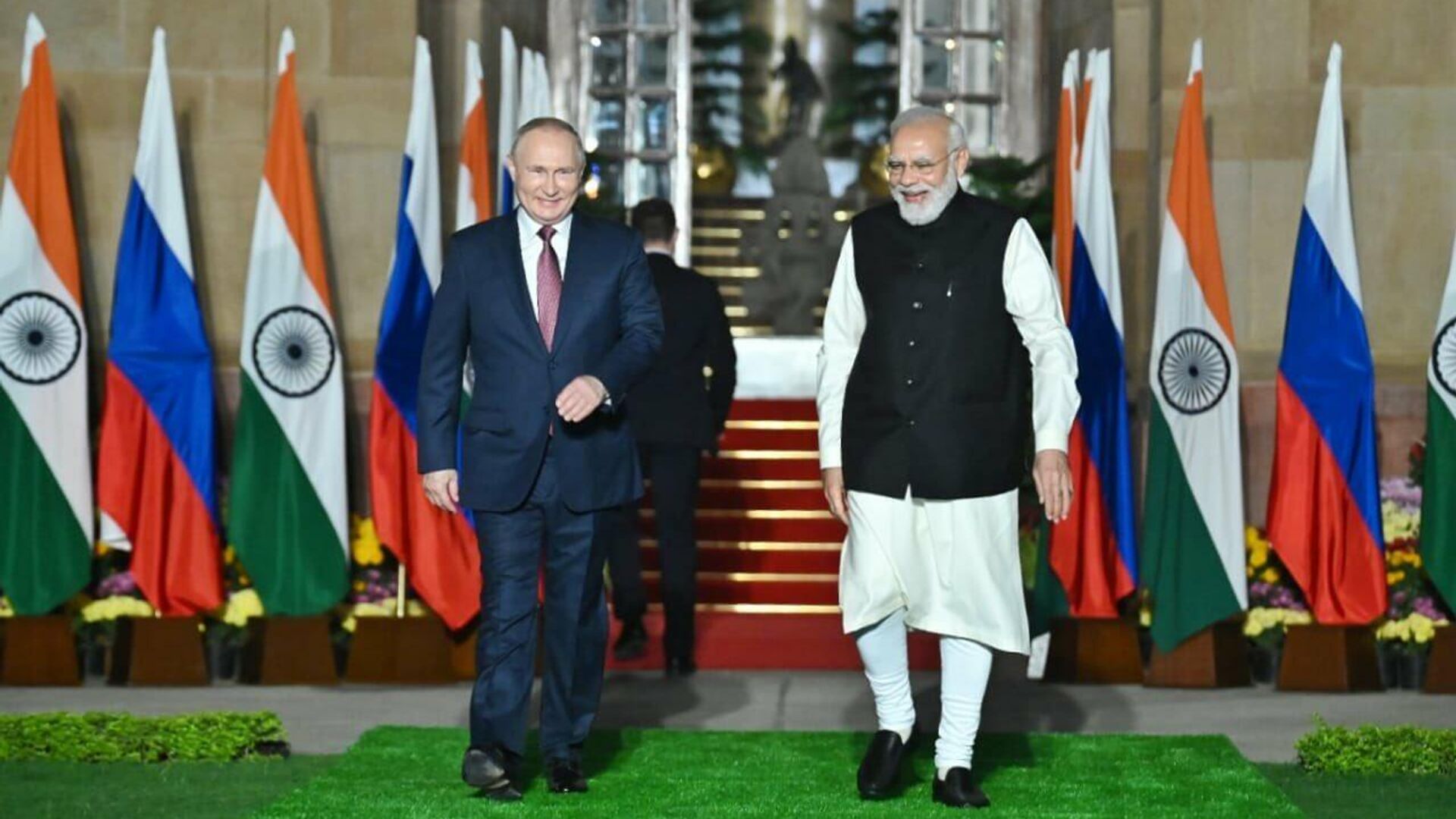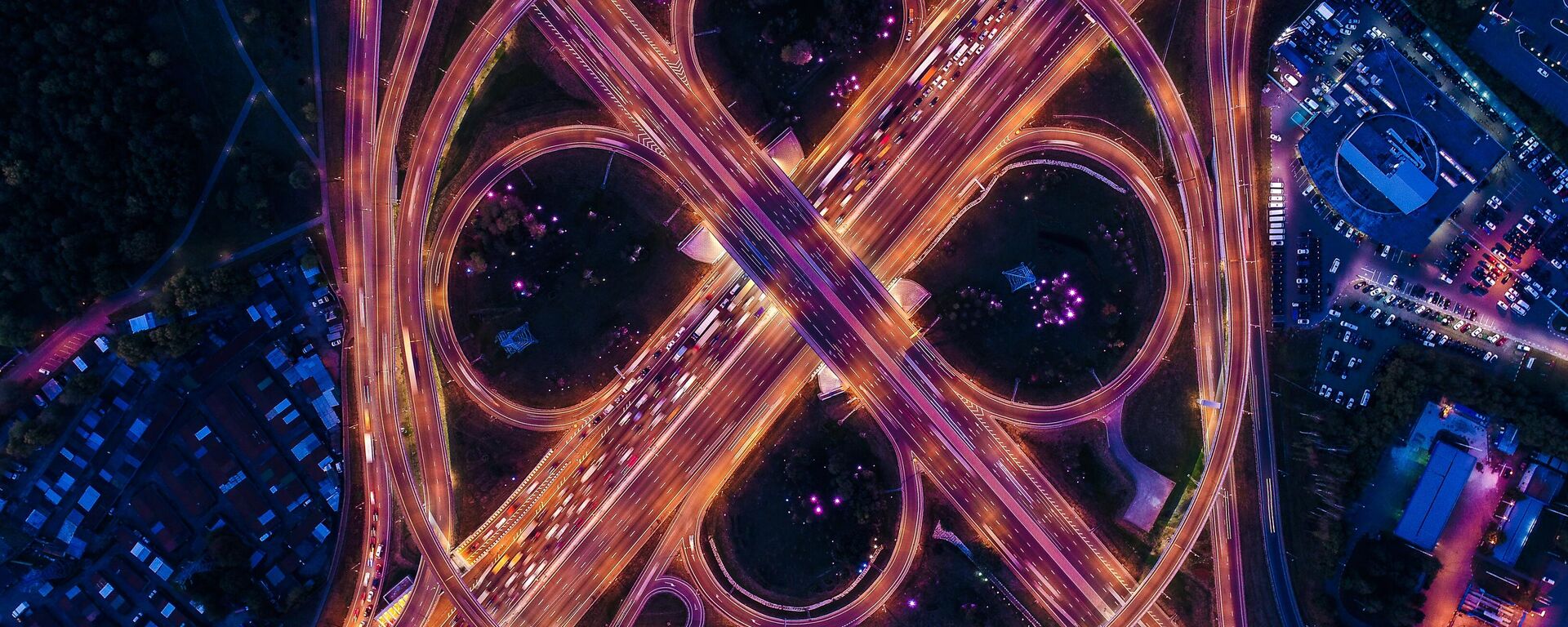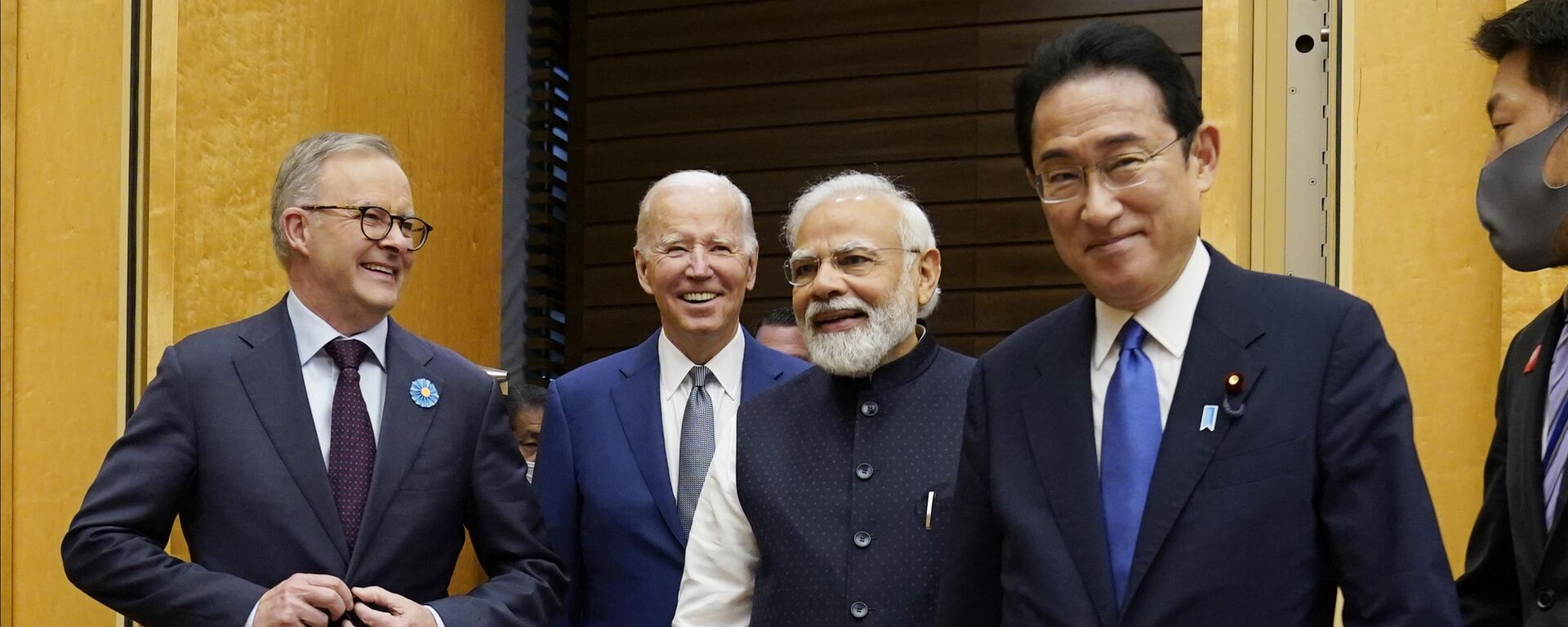https://sputniknews.in/20230401/india-russia-can-become-leaders-of-the-technological-nonalignment-movement-1383428.html
India, Russia Can Become Leaders of the 'Technological Nonalignment Movement'
India, Russia Can Become Leaders of the 'Technological Nonalignment Movement'
Sputnik India
Since last year, the historic ties between India and Russia have been scaling new heights. The cooperation between both the countries has grown from defence to... 01.04.2023, Sputnik India
2023-04-01T09:00+0530
2023-04-01T09:00+0530
2023-04-01T09:00+0530
indo-russian relations
new delhi
delhi
it industry
russia
cyber security
cyber warfare
business
trade corridor
smart cities
https://cdn1.img.sputniknews.in/img/07e6/0c/1e/335001_0:71:1280:791_1920x0_80_0_0_6ddd38fc097d238fb350787c8b5d25f6.jpg
Amid the changing geopolitical situation, the Russia—India Business Forum: Strategic Partnership for Development and Growth was organized in New Delhi as part of St. Petersburg International Economic Forum’s foreign events program.IT, cybersecurity, technological sovereignty, smart cities, transport and logistics and pharmaceuticals were the main topics discussed during the forum.Against the backdrop of the event, Andrey Bezrukov, President of the Technological Sovereignty Exports Association and Professor at the Department of Applied International Analysis at MGIMO University, spoke to Sputnik on how strategic partnership between India and Russia has helped the world, and areas of technological cooperation between the two countries, among other key issues.Sputnik: The India-Russia Business Forum is talking about the countries' strategic partnership for development and growth, specifically in the tech sector. Why it is beneficial for Russia and India to cooperate in the tech sector? What exactly can the two countries offer one another?Bezrukov: See, if you look at the technological space right now, it is dominated by either Western or Chinese companies. So either of those companies come with their rules and impose them on consumers, and businesses. This is never good for countries like Russia or India to play by somebody else's rules, because if you play by somebody else's rules, you are a loser by definition.In such a project, in the technological space, somebody will have to take the lead and I believe that Russia and India are the countries that can take the lead for two reasons. First of all, they are big players, and only big players can be leaders. Secondly, they understand their role and are able to risk gathering everybody and creating what we might call a “technological non-alignment movement”, where we are not part of any block and not trying to impose any rules on somebody else as well as rest of the world. Rather we listen to everybody and create the business space or technology space which is inclusive, has open rules and where platforms are developed in a cooperative fashion and not just imposed on somebody.Sputnik: If Russia and India join forces in the tech sector, what are some promising areas of cooperation? What are some joint solutions they could offer to the world?Bezrukov: There are several key areas that India and Russia should start working together. First of all, everything which is financial related, because right now, looking at the new leadership in the world where, there are one billion people in the West and 7 billion people in the East and South. Those 7 billion people live by the financial rules of created by the West and for the West.Second one is global logistics where we have the possibility to build technologies that will connect to different platforms like logistical, financial, transport etc. and create a seamless environment in the big Eurasia, around Indian and Russia, between them, etc., including corridors which go through Central Asia, Iran and through ASEAN.The third one, I believe, is the smart cities, because currently India, Russia and the rest of the world is building smart cities but in a haphazard fashion. There is no security standard. Right now, the development of smart cities is hindered by the lack of standard and secure approach. So, if India and Russia get together and establish new standards for smart cities in terms of connectivity and security, we can create a huge business opportunity.Sputnik: We both attended the smart cities discussion. In your view, what role can Russia play in India’s smart cities mission?Bezrukov: First of all, Russia right now and Moscow in particular, is probably the best example how you can make cities smart, because Moscow has some unique solutions which are nowhere in the world applied. So, that’s one example.Apart from this, I think that once Indian and Russian businesses get together they will have the advantage of scope and broad capabilities because the IT industry in India is flourishing and Russia has very good people working in IT. So, I think it's very good for both countries.Sputnik: Most of India's IT exports go to the West. Up until recently, the same was true with Russia. So are there any lessons that India can draw from Russia's experience? What are the risks of relying too heavily on the West?Bezrukov: Well, what you mentioned is the result of how global systems were built. It was centered around the West for India, Russia and many other countries. But if you look at the South, trade is developing. Now, we know that in a few years, the main trade and financial flows will not go to the West.Sputnik: During one of the sessions in the forum, there was a discussion about cyber war. Is this a shared threat for Russia and India? If so, how can the two countries work together to mitigate it?Bezrukov: Cyber security is a key topic for any country, especially when you create modern IT infrastructure. You have to make sure that your first commitment before you do anything else is that it is secure. Can you imagine if you can switch off Smart City? It's a disaster, right? So you have to make sure that whatever you build in the virtual space has to be properly protected. Here it can be done through developing of new standards. New standards by definition, should be shared. It cannot be extended to one country because businesses are virtually global. The flows are global.Russian and Indian businesses should get together; countries and regulating bodies should get together and work on developing new cyber security code, new rules of interaction, security and new standards for key areas such as smart cities, business to business interaction, digital transformation of businesses, those systems which are virtual systems built around businesses etc.
https://sputniknews.in/20230312/22-smart-cities-in-india-to-be-ready-by-april-report-1134987.html
https://sputniknews.in/20230331/india-will-never-be-us-ally-despite-ties-senior-white-house-official-1382065.html
new delhi
delhi
russia
Sputnik India
feedback.hindi@sputniknews.com
+74956456601
MIA „Rossiya Segodnya“
2023
Rahul Trivedi
https://cdn1.img.sputniknews.in/img/07e6/0c/13/136500_0:0:628:627_100x100_80_0_0_72097ff894c7446b70d2efafcb719720.jpg
Rahul Trivedi
https://cdn1.img.sputniknews.in/img/07e6/0c/13/136500_0:0:628:627_100x100_80_0_0_72097ff894c7446b70d2efafcb719720.jpg
News
en_IN
Sputnik India
feedback.hindi@sputniknews.com
+74956456601
MIA „Rossiya Segodnya“
Sputnik India
feedback.hindi@sputniknews.com
+74956456601
MIA „Rossiya Segodnya“
Rahul Trivedi
https://cdn1.img.sputniknews.in/img/07e6/0c/13/136500_0:0:628:627_100x100_80_0_0_72097ff894c7446b70d2efafcb719720.jpg
andrey bezrukov, st. petersburg international economic forum, russia—india business forum: strategic partnership for development and growth, technological cooperation between india and russia, technological non-alignment movement, smart cities, india-russia trade,
andrey bezrukov, st. petersburg international economic forum, russia—india business forum: strategic partnership for development and growth, technological cooperation between india and russia, technological non-alignment movement, smart cities, india-russia trade,
India, Russia Can Become Leaders of the 'Technological Nonalignment Movement'
Exclusive
Since last year, the historic ties between India and Russia have been scaling new heights. The cooperation between both the countries has grown from defence to other sectors as well.
Amid the changing geopolitical situation, the Russia—India Business Forum: Strategic Partnership for Development and Growth was organized in New Delhi as part of St. Petersburg International Economic Forum’s foreign events program.
IT, cybersecurity, technological sovereignty, smart cities, transport and logistics and pharmaceuticals were the main topics discussed during the forum.
Against the backdrop of the event, Andrey Bezrukov, President of the Technological Sovereignty Exports Association and Professor at the Department of Applied International Analysis at MGIMO University, spoke to Sputnik on how strategic partnership between India and Russia has helped the world, and areas of technological cooperation between the two countries, among other key issues.
Sputnik: The India-Russia Business Forum is talking about the countries' strategic partnership for development and growth, specifically in the tech sector. Why it is beneficial for Russia and India to cooperate in the tech sector? What exactly can the two countries offer one another?
Bezrukov: See, if you look at the technological space right now, it is dominated by
either Western or Chinese companies. So either of those companies come with their rules and impose them on consumers, and businesses. This is never good for countries like Russia or India to play by somebody else's rules, because if you play by somebody else's rules, you are a loser by definition.
So in the current world, I think it's time for India and Russia to get together and not just those two countries, but with other countries which would like to write new rules which will benefit everybody, not just West or China but everybody.
In such a project, in the technological space, somebody will have to take the lead and I believe that Russia and India are the countries that can take the lead for two reasons. First of all, they are big players, and only big players can be leaders. Secondly, they understand their role and are able to risk gathering everybody and creating what we might call a “technological non-alignment movement”, where we are not part of any block and not trying to impose any rules on somebody else as well as rest of the world. Rather we listen to everybody and create the business space or technology space which is inclusive, has open rules and where platforms are developed in a cooperative fashion and not just imposed on somebody.
Sputnik: If Russia and India join forces in the tech sector, what are some promising areas of cooperation? What are some joint solutions they could offer to the world?
Bezrukov: There are several key areas that India and Russia should start working together. First of all, everything which is financial related, because right now, looking at the new leadership in the world where, there are one billion people in the West and 7 billion people in the East and South. Those 7 billion people live by the financial rules of created by the West and for the West.
So right now, Russia and India have the responsibility for creating new financial systems, which would be easier, faster, better, more secure by the very fact that it will be new, it will be not coming from the past, from the kind of paper environment, but it will be purely digital, secure, etc.
Second one is global logistics where we have the possibility to build technologies that will connect to different platforms like logistical, financial, transport etc. and create a seamless environment in the big Eurasia, around Indian and Russia, between them, etc., including corridors which go through Central Asia, Iran and through ASEAN.
The third one, I believe, is the smart cities, because currently India, Russia and the rest of the world is building smart cities but in a haphazard fashion. There is no security standard. Right now, the development of smart cities is hindered by the lack of standard and secure approach. So, if India and Russia get together and establish new standards for smart cities in terms of connectivity and security, we can create a huge business opportunity.
Sputnik: We both attended the smart cities discussion. In your view, what role can Russia play in India’s smart cities mission?
Bezrukov: First of all, Russia right now and Moscow in particular, is probably the best example how you can make cities smart, because Moscow has some unique solutions which are nowhere in the world applied. So, that’s one example.
As far as the contribution of Russia is concerned, it can contribute in the systematic approach and security. This year, ever since the Ukraine conflict, every day Russian businesses, government sites and systems are being attacked from all the sides. Despite all the attacks, they are standing tall, nothing happened to them. It means that Russian cyber security is working very well. Russian cyber security traditionally had a very good systematic approach. So we can definitely contribute to securing smart cities.
Apart from this, I think that once Indian and Russian businesses get together they will have the advantage of scope and broad capabilities because the IT industry in India is flourishing and Russia has very good people working in IT. So, I think it's very good for both countries.
Sputnik: Most of India's IT exports go to the West. Up until recently, the same was true with Russia. So are there any lessons that India can draw from Russia's experience? What are the risks of relying too heavily on the West?
Bezrukov: Well, what you mentioned is the result of how global systems were built. It was centered around the West for India, Russia and many other countries. But if you look at the South, trade is developing. Now, we know that in a few years, the main trade and financial flows will not go to the West.
The West is stagnating, the East is booming, and Russia will be growing too because we changed the economic system. We’ve become self-sufficient. Now you will have growth in Russia. So Russian markets will be open for Indian businesses more than they were and Indian businesses can find a lot of partners and resource in Russia. I think our cooperation here is very beneficial; it has a bright future.
Sputnik: During one of the sessions in the forum, there was a discussion about cyber war. Is this a shared threat for Russia and India? If so, how can the two countries work together to mitigate it?
Bezrukov: Cyber security is a key topic for any country, especially when you create modern IT infrastructure. You have to make sure that your first commitment before you do anything else is that it is secure. Can you imagine if you can switch off Smart City? It's a disaster, right? So you have to make sure that whatever you build in the virtual space has to be properly protected. Here it can be done through developing of new standards. New standards by definition, should be shared. It cannot be extended to one country because businesses are virtually global. The flows are global.
Russian and Indian businesses should get together; countries and regulating bodies should get together and work on developing new cyber security code, new rules of interaction, security and new standards for key areas such as smart cities, business to business interaction, digital transformation of businesses, those systems which are virtual systems built around businesses etc.




